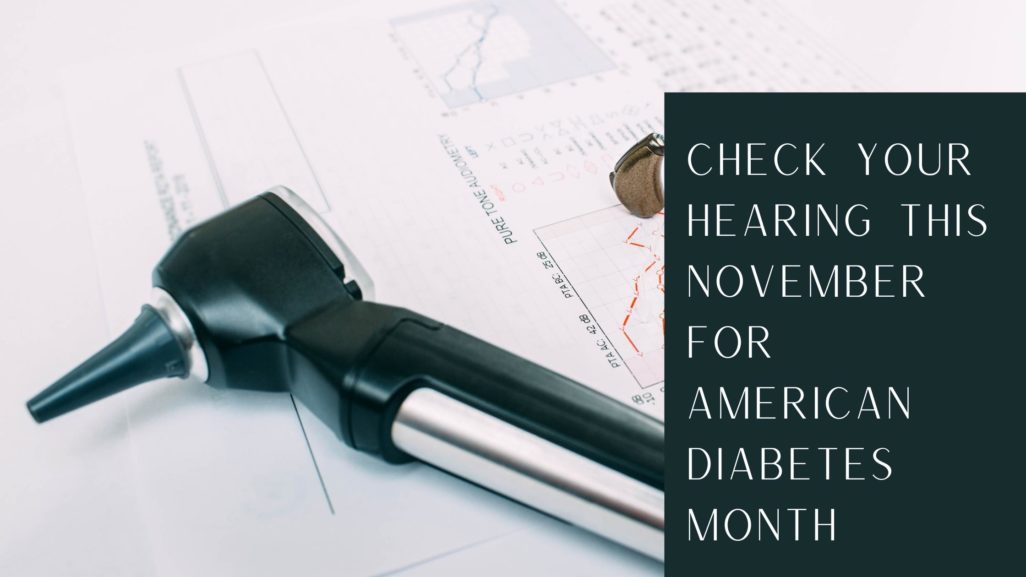You might already know a lot about diabetes. Maybe your doctor told you were at risk last year, and you have at least one family member who has diabetes. When you consider diabetes, you might think of heart problems, a diet, or the need to exercise more, but hearing loss is something you might not consider.
Diabetes and hearing loss are linked
You may be unaware of the increased risk of hearing loss associated with diabetes! In addition to raised blood sugar, an increased risk of heart attack and stroke, and kidney damage, diabetes can affect your ears and hearing.
According to a study conducted at the Henry Ford Hospital in Detroit, women over 60 with type 1 and 2 diabetes have significantly lower hearing than women without diabetes.
A 2008 study by the National Institutes of Health evaluated over 5,000 American questionnaires and found that 21% of people with diabetes also had hearing loss. More than twice as many diabetics have difficulties hearing as non-diabetics. The results are undeniable. If you have diabetes, you’re more likely to acquire hearing loss.
The effect diabetes has on your ears
While we know that diabetes raises your chances of developing hearing loss, we don’t know how diabetes causes hearing loss.
We know that elevated blood sugar levels, a significant component of diabetes, harm the blood cells throughout the body. According to one theory, this injury makes it more difficult for blood to circulate through the body and reach the ears. People with diabetes have a higher hearing loss rate because the ear’s sensitive cells are damaged or destroyed due to a lack of blood and oxygen.
Signs of hearing loss
If you or a loved one has diabetes, it’s critical to be aware of hearing loss’s warning symptoms and get treatment as soon as possible.
One of the first signs is an inability to keep up with conversations and frequently not understanding what’s being said. Because consonant sounds are difficult to hear for someone with hearing loss, even if you hear the words, you may struggle to understand what was said.
When you ask someone to repeat anything for the third time, both you and the person you’re talking to become frustrated. You might start staying at home instead of going out to dine with friends because you can’t keep up with the restaurant’s background noise. This isn’t a sign of becoming older; it’s an obvious indication of hearing loss.
You should also get your hearing checked immediately if you’ve been turning up the volume on the TV or have stopped chatting on the phone.
How to protect your hearing
Hearing loss is a possibility if you have diabetes. As directed by your family physician, control your blood sugar levels to avoid further damage to your blood cells and ears. Eat well and exercise regularly to maintain a healthy lifestyle. This is beneficial to your diabetes, ears, and overall health and well-being.
Finally, it’s critical that you and your loved ones over the age of 60 get yearly hearing examinations and that any hearing loss is treated as soon as possible. This will help get you the right treatment for your ears and help you continue to appreciate all of the sounds around you for many years to come.
We’re here for you
If you have diabetes and are experiencing hearing loss, why not use American Diabetes Month to change? Your ability to hear is within your grasp.
Here at Comprehensive Ear and Hearing, we work with the world’s top hearing aid manufacturers to provide you with the finest in hearing health. Whatever your hearing needs, we have hearing aids that will fit perfectly into your life, from stylish behind-the-ear devices to practically imperceptible in-the-canal components.
The latest hearing aids will allow you to follow conversations, improve relationships, and enjoy your favorite pastimes thanks to directional microphones, voice enhancement, and noise reduction.
Call us today to schedule a hearing test or speak with a hearing professional about your hearing health.


